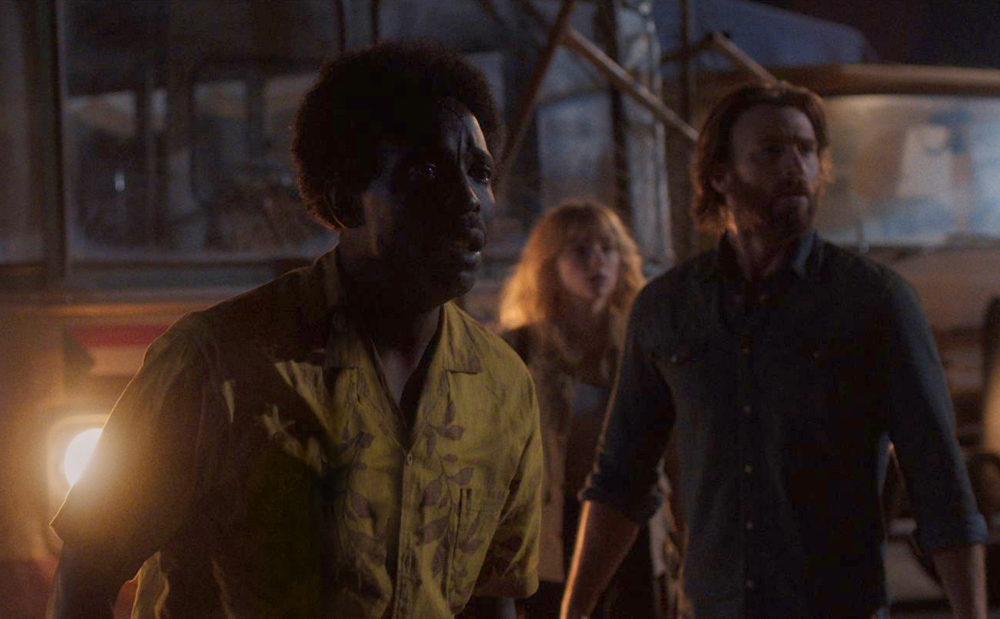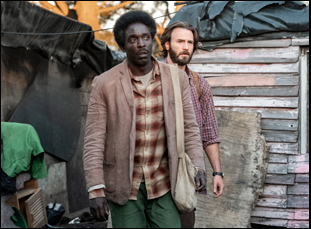“Not one person I would’ve chosen for this mission,” Ethan Levin (Ben Kingsley), a Mossad commander says, looking over the motley set of agents that have been assembled for an undercover mission in “Red Sea Diving Resort,” arriving on Netflix in the middle of the summer as if it were an oasis in the middle of the desert. Based on a true story, but refreshingly unpretentious, the thriller is actually set amidst the blistering heat of Sudan where Levin has dispatched a crew, under the guise of being the staff of a seaside hotel, to use their proximity to the water as the gateway to smuggle persecuted Jews from Ethiopia to safer shores in the dark of night. As you’d suspect, these agents weren’t trained to be housekeepers and valets, making the job of tending to tourists somewhat awkward, but they aren’t the most ideal partners in spy work, either, with former partners Ari (Chris Evans) and Sammy (Alessandro Nicola) uneasily reuniting after the latter felt their last rescue mission was too much of a close call and others such as the no-nonsense Rachel Reiter (Haley Bennett) and the well-tanned Jake Wolf (Michiel Huisman) having personalities that don’t naturally mesh.
However, against all odds, they work together remarkably well, something that could be said of the mashup of tones seamlessly blended together by Gideon Raff, the co-creator of “Homeland” and “Tyrant” returning to make his first feature in over a decade. After starting out in the indie space directing low-budget genre films, Raff clearly was waiting to spread his wings with sprawling tales of international intrigue that could span across seasons, yet finds an isolated incident in “Operation Brothers,” the Mossad mission that saved thousands of lives between 1981 through 1985, that distills his ability to transform geopolitical minutiae into compelling drama. Taking full advantage of the ‘80s milieu, complete with winking transitions such as “Star Wars”-style screen wipes and Duran Duran’s “Hungry Like the Wolf” going from electric to acoustic, and a deep bench of gifted actors including Michael K. Williams and Greg Kinnear in supporting roles, the film offers the kind of breezy action adventure as one would find in the era without any nostalgia for the antisemitism that led to such a precarious situation to begin with.
On the eve of its Netflix debut, Raff spoke about working on a film set in the past that felt as if it were very much taking place in the present, if for no other reason than files on the operation were only recently declassified, as well as returning to the film world and filming in Africa.
I was born and raised in Jerusalem, so every thing that has to do with my neighborhood is always fascinating to me, but definitely if it’s a story with a lot of heart. And the exodus of the Ethiopian Jews to Israel is one of those stories of sacrifice and heroism and courage that I thought really had to be told. I actually learned about this specific operation through my producer Alexandra [Milchan] and I went to Israel and met with the Mossad agents who operated this hotel and I met with many of the Ethiopian Jews who did this very hard journey across the desert. I was really impressed and inspired by all of them and wanted to tell their story right.
Is this one of those situations where documents are declassified over the years?
Yes, that’s exactly what it was. This specific operation was only declassified a few years ago and even during my interviewing of the agents, sometimes they had to go back to make a phone call to make sure they can talk about a specific detail. Like when I asked about whatever communication devices or what company they used to lease the hotel or stuff like that, they always had to check and make sure that I can actually use the facts or if I have to make up some shit. [laughs]
Was making a feature something you were looking forward to coming back to?
Funny enough, yes and no. There’s such a freedom in television right now to tell the story in a way that it’s however long it should be and the formats are so flexible right now, especially with places like Netflix. But when this opportunity presented itself to write and direct this feature, I thought this is fantastic to go back to it. I always try and remind myself what a privilege it is that somebody gives you a big chunk of change to tell a story that’s important to you and even when the days are hard, I never forget that.
You should know better than anybody at this point after “Homeland” and “Tyrant,” but when making a film for a mass audience and the cultural sensitivities involved, is it difficult to figure out who should be driving a geopolitical story like this?
It’s a consideration and it’s an important discussion. In this case, I really wanted to put an emphasis on the partnership between the Chris Evans character, who in real life is inspired by two of the commanders of the operation and Michael K. Williams, who is inspired by these community leaders Ferede Aklum and Baruch Tegegne, who really started this whole operation and have been active in the rescue of the Ethiopian Jews as the Mossad has been, if not more.
Where’d you find these locations?
We shot around South Africa for most of it and then the hotel was created in Namibia, which is out of this world. It’s so surreal. The weather is unpredictable and you’re basically in this gorgeous desert that looks like nothing you’ve ever seen. It’s such a beautiful landscape and the crews are so good.
Did you actually take the cast deep sea diving?
They were scuba diving…some of them in real water and some of them in tanks when we needed it to be a little clearer. We also sent a second unit to Sharm El Sheikh in Egypt to show some of the Red Sea.
This has a really fun, adventurous quality to it, though it’s easy to see how the story could lend itself to a gritty, ultra-realistic treatment. How did you decide on the tone?
When I was sitting with the DoD in Israel [or] with the Mossad agents, we were half the time crying and half the time laughing. That’s what so unique about this operation, about the Mossad agents running a fake hotel during the day, doing massage therapy, laundry and breakfast for tourists and at night, smuggling people in horrible conditions to Navy SEALS, waiting for them on some secluded beach. This craziness had to live together, these moments of humor together with these moments of tragedy and one of the ways to deal with it was to take some of the language of the ‘80s for the transitions, for the music, to blend that tone together.
Of course, there’s an acknowledgement at the end of the film regarding the ongoing refugee crisis. Were current events influencing the story you wanted to tell in anyway?
When I was actually doing it, who’s got time to open the news? [laughs] But when I was researching it, what struck me about this story is that it’s so relevant to today. It’s so timely in that it’s not just a historical thriller or drama or action movie. It’s actually about something that we read about in our headlines every moment of the day. We live in a world where there are 65 million displaced people and people who are seeking a better future for themselves and this is a problem that is actually growing, not shrinking and we need to address it. And I wanted to tell a story of an example of when we realize that we’re all the same, we all deserve the same and that we can help each other.
“Red Sea Diving Resort” is now streaming on Netflix.





